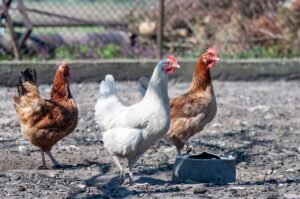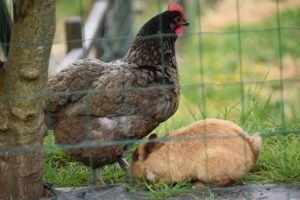
During the winter months, it’s essential to take extra precautions to keep your chickens safe and healthy. One common concern during this time of the year is respiratory infections, which can spread quickly among your flock and have detrimental effects. But fear not, because in this article, we will explore various strategies and tips to protect your chickens from these infections during the colder months. So grab a warm cup of tea, sit back, and get ready to learn how to keep your feathered friends happy and infection-free this winter!

Biosecurity Measures
Limiting Visitors
One important step in protecting chickens from respiratory infections in the winter is to limit visitors to the coop. By minimizing the number of people who have access to your chickens, you can reduce the risk of introducing any potential pathogens. It’s a good idea to have a strict policy in place that requires visitors to wash their hands thoroughly before entering the coop area.
Quarantine Procedures
Implementing quarantine procedures is another crucial biosecurity measure. Whenever you introduce new birds to your flock or bring home supplies or equipment, it’s essential to isolate them for a specific period of time. This quarantine period allows you to observe the health of the new additions and prevent the spread of any potential respiratory infections.
Sanitization Practices
Regular and thorough sanitization practices are essential to maintain a healthy environment for your chickens. Clean and disinfect the coop and surrounding areas regularly to minimize the presence of bacteria and viruses. Pay particular attention to high-touch surfaces such as feeders, waterers, and nesting boxes, as these areas can harbor pathogens.
Proper Waste Management
Proper waste management is crucial in preventing the buildup of harmful bacteria and pests. Regularly remove soiled bedding and manure from the coop to reduce the risk of respiratory infections. Consider composting the waste in a separate designated area away from the coop to further minimize the risk of contamination.
Rodent and Pest Control
Rodents and pests can not only cause stress to your chickens but also bring in diseases. Implement effective rodent and pest control measures to protect your flock. Keep feed stored securely in rodent-proof containers and ensure there are no gaps or openings in the coop that would allow pests to enter. Regularly inspect the coop for signs of pest activity and address any issues promptly.
Maintaining Optimal Temperature
Insulating the Coop
Proper insulation is essential to maintain a stable temperature inside the coop during the winter months. Insulate the walls and the roof of the coop to prevent cold drafts and maintain a comfortable environment for your chickens. This will help them conserve energy and reduce the risk of respiratory infections.
Heating Methods
In colder regions, providing supplemental heat in the coop can be beneficial, especially during extremely cold periods. Use safe heating methods such as radiant heaters or heat lamps to provide warmth without posing a fire hazard. Ensure the heating devices are securely installed and kept away from flammable materials.
Ventilation Systems
While it’s important to keep the coop warm, proper ventilation is equally crucial for preventing respiratory infections. A well-ventilated coop allows for the removal of excess moisture, ammonia, and dust that can contribute to respiratory issues. Install proper ventilation systems, such as vents and windows, to ensure a continuous flow of fresh air without subjecting the chickens to drafts.

Regular Health Checks
Observing Signs of Illness
Regularly observe your chickens for any signs of illness. Look for symptoms such as coughing, nasal discharge, sneezing, wheezing, or difficulty breathing. It’s essential to detect respiratory infections early to prevent their spread to the rest of the flock. If you notice any concerning signs, isolate the affected chicken and consult with a veterinarian for further guidance.
Auscultation of Respiratory Sounds
Auscultating or listening to the respiratory sounds of your chickens can provide valuable insights into their health. Using a stethoscope or by simply placing your ear close to their chest, listen for any abnormal sounds, such as crackling or wheezing. If you notice any unusual respiratory sounds, seek professional advice from a veterinarian.
Fecal Examinations
Regular fecal examinations can help detect any internal parasites that might be affecting the respiratory health of your chickens. Many respiratory infections can be caused or worsened by parasitic infestations. Consult with a veterinarian to determine a fecal examination schedule and appropriate deworming protocols.
Vaccinations
Vaccinations are crucial in preventing respiratory infections in chickens. Work with a veterinarian to develop a vaccination schedule tailored to your specific flock’s needs. Vaccines against common respiratory pathogens such as infectious bronchitis virus and Newcastle disease virus can provide significant protection.
Promoting Good Hygiene
Clean Bedding
Maintaining clean bedding is essential for promoting good hygiene in the coop. Regularly remove soiled or wet bedding and replace it with fresh, clean material. Clean bedding helps to absorb moisture, reduce odors, and minimize the risk of bacterial and fungal growth that can cause respiratory issues.
Clean Water Sources
Providing clean and fresh water is vital for the overall health of your chickens. Regularly clean and refill waterers to ensure they are free from debris, algae, and bacteria. A clean water source helps to keep your chickens hydrated and reduces the risk of respiratory infections.
Regular Cleaning of Feeders and Waterers
Regularly clean and sanitize feeders and waterers to prevent the buildup of bacteria and other pathogens. Remove any leftover feed and rinse the containers with warm, soapy water. Rinse thoroughly to remove any soap residue, and allow the feeders and waterers to dry completely before refilling them.
Proper Handling and Disposal of Sick Birds
If you have a sick bird, it’s crucial to handle it with care to avoid the potential spread of respiratory infections. Wear disposable gloves while handling the sick bird and wash your hands thoroughly afterward. Dispose of any bedding or materials that came into contact with the sick bird properly to reduce the risk of transmission.

Nutritional Support
Balanced Diet
Providing a balanced and nutritious diet is essential for maintaining a strong immune system in your chickens. Include a variety of food sources such as grains, seeds, fruits, vegetables, and protein-rich foods. Ensure that the feed you provide meets the nutritional requirements of your specific breed and age of chickens.
Supplementation
During the winter months, when fresh forage may be limited, consider supplementing your chickens’ diet with additional nutrients. Adding vitamins and minerals, such as vitamin C, vitamin E, and selenium, can help support their immune system and reduce the risk of respiratory infections.
Hydration
Proper hydration is essential for your chickens’ overall health and respiratory function. Ensure your chickens always have access to clean and fresh water. Monitor their water intake daily to ensure they are staying adequately hydrated. During colder periods, consider using heated waterers to prevent freezing.
Minimizing Stress
Avoiding Overcrowding
Overcrowding can lead to increased stress levels in chickens, making them more susceptible to respiratory infections. Provide sufficient space for each bird to move freely and establish their pecking order. Avoid overcrowding the coop, especially during the winter when chickens spend more time indoors.
Keeping a Calm Environment
Maintaining a calm and peaceful environment in the coop is crucial for minimizing stress levels in your chickens. Loud noises, sudden movements, and other stressors can compromise their immune system and make them more vulnerable to respiratory infections. Create a peaceful environment by minimizing disturbances and providing a secure and safe space for your chickens.
Providing Enrichment
Enrichment activities can help reduce stress and keep your chickens engaged. Provide environmental enrichment such as perches, toys, and dust bathing areas to encourage natural behaviors. This can help distract them from potential stressors and promote overall well-being.
Preventing Predation
The presence of predators in the vicinity can cause constant stress in chickens, making them more prone to respiratory infections. Secure the coop and run with appropriate fencing and netting to prevent access from predators. Regularly inspect the perimeter for any signs of damage or potential entry points.
Preventing Drafts
Sealing Cracks and Gaps
Drafts can expose your chickens to cold temperatures and increase the risk of respiratory infections. Inspect the coop regularly and seal any cracks, gaps, or holes. Use caulking or weatherstripping to ensure a tight seal, especially around windows, doors, and ventilation systems.
Using Draft Guards
Using draft guards is an effective way to prevent cold drafts from entering the coop while still allowing for proper ventilation. You can use materials such as rubber weatherstripping or flaps of heavy-duty plastic to create draft barriers around windows and doors.
Blocking Excessive Wind
In regions with strong winds, consider creating windbreaks around the coop area. Planting dense shrubs or erecting solid fences can help block excessive wind and protect your chickens from cold gusts. Ensure these windbreaks do not obstruct the ventilation systems in the coop.
Avoiding Contamination
Separate Coop and Run
Separating the coop and run areas is crucial in preventing the contamination of your chickens’ living space. This separation helps to prevent the transfer of pathogens from the outside environment to the coop. Ensure there is a clear boundary between the two areas and practice good biosecurity measures when moving between them.
Cleaning and Disinfecting Shoes and Tools
Shoes and tools can carry pathogens from one area to another, increasing the risk of contamination. Clean and disinfect your shoes and tools before entering the coop. Use a footbath or disinfectant spray to sanitize your footwear, and regularly clean and disinfect tools to minimize the spread of potential respiratory pathogens.
Preventing Introduction of Outside Birds
Introducing new birds to an established flock can introduce respiratory infections if the newcomers are carriers of any pathogens. Whenever adding new birds to your flock, quarantine them and have them properly tested and treated for common respiratory diseases before introducing them to the rest of the flock.
Proper Coop Design
Adequate Space
Adequate space is necessary to provide a comfortable living environment for your chickens and reduce the risk of respiratory infections. Ensure that each bird has enough space to move, perch, and nest comfortably. A general guideline is to allow at least 4 square feet of floor space per standard-sized chicken.
Good Ventilation
Proper ventilation is crucial for preventing the buildup of moisture, ammonia, and other respiratory irritants in the coop. Design the coop with windows, vents, or openings that allow for the exchange of air without exposing the chickens to drafts. This will help maintain proper airflow and minimize the risk of respiratory infections.
Easy Cleaning
A coop design that facilitates easy cleaning is essential for maintaining good hygiene and reducing the risk of respiratory infections. Ensure that all areas of the coop, including nest boxes, perches, and flooring, are easily accessible for cleaning. Use removable trays or flooring materials that can be easily removed and sanitized.
Proper Placement
The placement of the coop can significantly influence the respiratory health of your chickens. Avoid placing the coop in low-lying areas that are prone to dampness or areas with poor air quality. Ideally, position the coop in a well-drained area with good exposure to sunlight, which can help reduce moisture buildup and support good respiratory health.
Education and Research
Understanding Respiratory Infections
Educating yourself about common respiratory infections in chickens is vital for their prevention and control. Learn about the signs, symptoms, and transmission routes of respiratory diseases to better understand how to protect your flock. Research reputable sources or consult with poultry health professionals to stay updated on the latest information.
Staying Informed on Best Practices
The field of poultry health and husbandry is continually evolving, and it’s essential to stay informed on best practices. Regularly consult reliable sources such as poultry health organizations, veterinary associations, or government agricultural agencies for updated guidelines and recommendations. Implementing these best practices can greatly reduce the risk of respiratory infections in your flock.
Consulting with Veterinarians
If you have any concerns or questions regarding the respiratory health of your chickens, don’t hesitate to consult with a veterinarian. They can provide professional guidance, conduct necessary diagnostic tests, and recommend appropriate treatments or preventive measures. Regular check-ups with a poultry veterinarian can help ensure the overall health and well-being of your flock.







